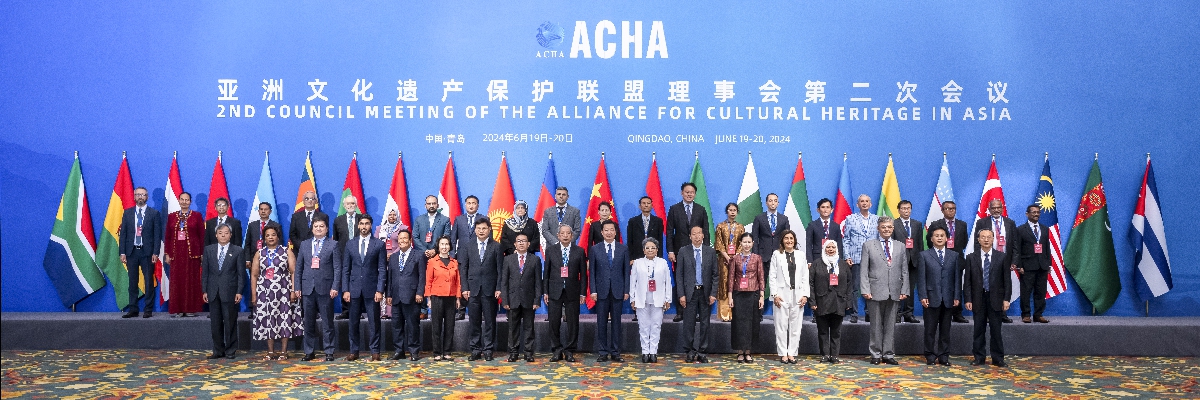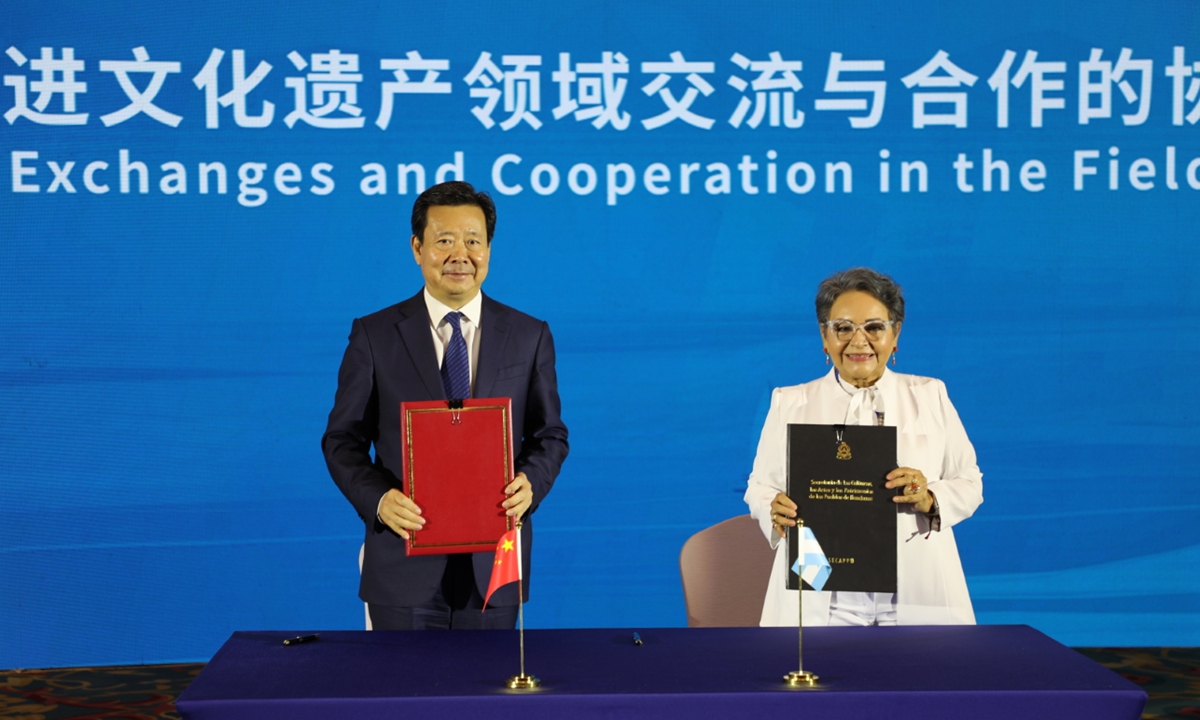
Photo: Courtesy of National Cultural Heritage Administration
More countries have expressed their willingness to join the Alliance for Cultural Heritage in Asia (ACHA) to better cooperate on cultural heritage protection at the 2nd Council Meeting in Qingdao, East China's Shandong Province, on Wednesday. They gave an active response to the China-proposed Global Civilization Initiative, while expressing hopes for more cultural exchanges to promote diversity and harmony among different civilizations.
About 150 representatives from 23 countries and two significant international organizations in the field of cultural heritage attended the meeting, according to the National Cultural Heritage Administration.
According to an announcement released at the event, Uzbekistan and the Maldives have been made new member states of the ACHA, while Honduras becomes a new partner state of the alliance.
Li Qun, chairperson of the ACHA Council and vice minister of China's Ministry of Culture and Tourism, highlighted the growing international influence of the ACHA, which was established in 2023 and now boasts an impressive 20 states, with countries like Egypt, South Africa, and Tunisia also expressing an interest in joining.
Many representatives of the participating countries spoke highly of the work carried out by the alliance and China to protect Asian cultural heritage.
Phinij Jarusombat, a former deputy prime minister of Thailand and president of the Thai-Chinese Cultural and Relationship Council, said at the opening ceremony that China has laid a solid foundation and set a good example in the protection of cultural heritage. He said that the ACHA can greatly contribute to the diversity and sustainable development of world civilizations.
During the meeting, China and Honduras signed a first cooperation agreement in the field of cultural heritage since the establishment of diplomatic ties between the two countries in 2023. The two sides agreed to carry out practical cooperation in cultural relic protection, archaeological research, museum exchanges and personnel training, and deepen cooperation in archaeological research, display and utilization of the ancient Copan site.
Gloria Annarella Velez Osejo, the minister of Culture, Arts, and Heritage of Honduras, expressed her gratitude to China for offering international archaeological aid to many countries, and emphasized the importance of such dialogues in promoting peace.
She told the Global Times on Wednesday that considering the war and conflict prevalent in today's intense global situation, it is necessary to build spaces that promote peace and share different, diverse points of view. She noted that she expects more joint projects to be carried out in the two countries.

Photo: Courtesy of National Cultural Heritage Administration
The meeting reviewed and approved the implementation of the alliance's work plan for 2023-24 and the work plan for 2024-25. It announced 15 Asian Cultural Heritage Protection Fund projects for 2023, which will involve countries like Iran, Syria, Azerbaijan, Kyrgyzstan, Uzbekistan, Sri Lanka, Vietnam, and the United Arab Emirates.
The Asian Fund, based on the principles of respecting national sovereignty and equal cooperation, aims to consolidate an international consensus on cultural heritage protection that focuses on research, restoration, joint archaeology, joint heritage nominations, and technological protection, noted the document.
Under the alliance's framework, practical cooperation in cultural heritage among Asian countries has been thriving. Examples of this cooperation include ongoing joint archaeology and restoration projects such as the preservation of the Preah Vihear Temple in Cambodia and the Nuwakot Durbar royal palace in Nepal.
Pen Moni Makara, undersecretary of state of the Ministry of Culture and Fine Arts of Cambodia, praised the achievements of Chinese archaeologists in combining archaeological theory with local characteristics at sites, highlighting the restoration of Angkor Wat as a model of international cultural heritage cooperation recognized by UNESCO.
"The alliance is now recognized as an essential part of the global cultural dialogue, playing a significant role in fostering understanding and cooperation among civilizations," he said.
On Wednesday afternoon, US citizen Paul Hollister donated a ceremonial robe worn by a low-rank official from the late Qing Dynasty (1644-1911) to the Shandong University Museum, further contributing to the friendly exchanges between Chinese and US people.
Moving forward, the alliance will enhance cooperation among different states, supporting joint archaeology and research along the Belt and Road Initiative, and promoting the strengthening of transnational joint heritage nomination mechanisms, including the Maritime Silk Road.
Under the alliance, there are plans to expand cooperation in the protection and restoration of cultural relics, with projects such as the study and protection of carbonized textiles at the Persepolis World Heritage site in Iran and the restoration of the National Museum of Latakia in Syria.
The ACHA will also conduct case studies on the reconstruction of cultural heritage in conflict areas, support inter-museum exchanges, organize exhibitions for dialogue between Chinese and Arab civilizations, and hold international seminars on the protection and return of colonial-era artifacts, according to the document.





